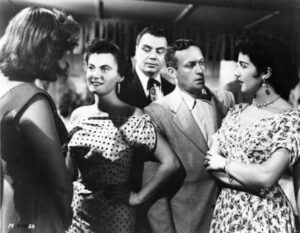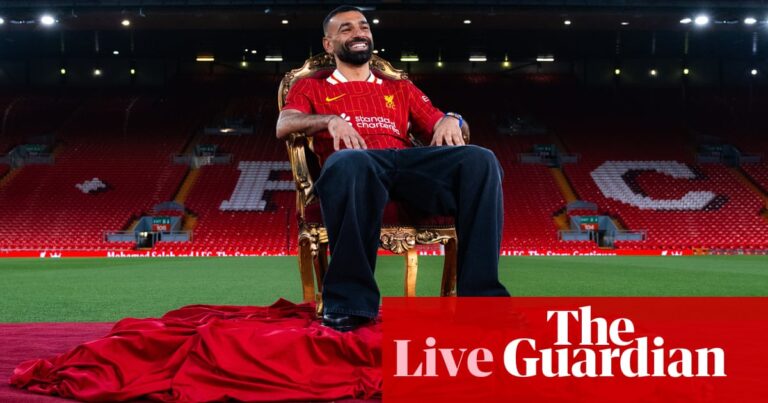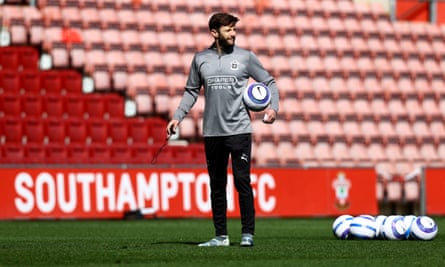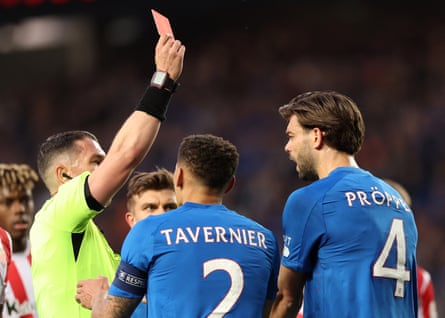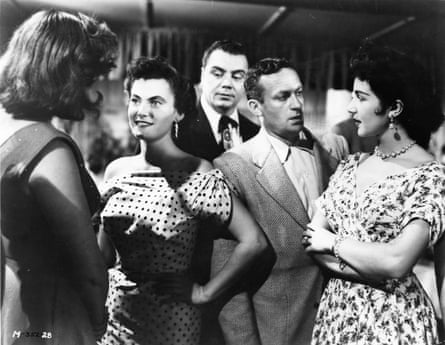Ian Alexander is scouring the signatures on a 34-year-old Bristol Rovers shirt, searching for clues over the identity of teammates with whom he shared the biggest day of his career.
The 61-year-old can recall little of the 1990 Leyland Daf Trophy final at Wembley, other than being taken off on a stretcher before half-time after a cynical challenge from Tranmere’s Neil McNab, although that injury pales compared with the severe damage to his brain sustained during his 13-year career.
In May, Alexander was diagnosed with chronic traumatic encephalopathy (CTE), the neurological condition believed to caused by repeated blows to the head, with doctors giving him between two and six years to live. The decline in his health has been quite dramatic since, with visits to watch his beloved Rovers often beyond him owing to anxiety and panic attacks, and the risk of swallowing his tongue has confined him to a soft-food diet. Within 20 minutes of a moving, amusing and life-affirming morning in his company, the softly spoken Scot begins to repeat himself.
Despite all this, Alexander considers himself to be “lucky” because he has a diagnosis, bringing clarity after years of confusion, bewilderment and fear. A chance email from the Bristol Rovers Former Players Association in January led to Alexander undergoing scans. His wife, Janet, is hoping a dementia diagnosis will follow on the NHS, opening access to medication for the chronic headaches and tremors which often leave him unable to sleep. His treatment is limited to paracetamol.
Since being diagnosed with CTE, Alexander has joined a group of about 60 former footballers taking legal action against the Football Association over brain injuries sustained during their careers, with the families of the late Nobby Stiles and Joe Kinnear also part of the claim being heard in the high court. The majority have retained their right to anonymity but Alexander, in speaking to the Guardian, has become the second former player go public after Aston Villa’s 1982 European Cup winner Colin Gibson.
“I just want more people to know about brain injuries suffered by footballers,” Alexander says. “I don’t care about getting money out of it. I just want to get the word out. About six months ago I was with four or five ex-players in the pub. I was telling them about my problems and they said: ‘That’s strange, it’s happening to me as well.’ There must be so many of them. I just want to help educate them so more of them go to get help.”
Alexander’s problems began a few years ago with his faltering memory making his job as a painter and decorator untenable. Frequent trips to the GP added to his frustration. He was repeatedly told that his symptoms were merely those of old age, despite the fact he was in his 50s.
“I’d be at a site painting, go out to get some lunch, and when I came back I’d have no idea where I was supposed to be,” Alexander says. “I’d go back to the wrong room and start painting somewhere else. It reached a point where I couldn’t go on.
“I went to see doctors in Glasgow a couple of years ago and told them I didn’t feel right – I was depressed, had anxiety. They just said it was old age. All I could get from them was: ‘You’re getting old, you’re getting old.’”
Alexander’s symptoms have worsened considerably since and he leans heavily on his wife Janet for help. The love, support and good humour in their Bristol home is palpable, with the pair also caring for Janet’s daughter Carla, who is registered disabled owing to chronic arthritis.
“I look after her and she looks after Carla,” Alexander says with a smile. “I tell them not to worry about me!”
Janet has a neurological condition of her own – fibromuscular dysplasia, which means she is blind on her right side – and is clearly a remarkable woman. Care and courage have been the cornerstones of Janet’s life – she lost two daughters to cystic fibrosis when they were young adults – but there is not a hint of resentment as she discusses the family’s situation.
“I look after Jocky [Ian] and he looks after me,” she says. “He likes to go to the football still, but sometimes it’s too much for him. He just gives me a nod, then we leave. The Rovers fans love him and all want to talk to him, so it can be quite draining. I can’t even get round the supermarket when he comes – the shopping takes hours!”
“We have to go shopping together as she can’t trust me,” Alexander says. “The other day she sent me out for milk and bread, and I came back with a tank of fuel! My phone is like a shopping list now. Every time I leave the house I need a list to make sure I get back OK.
“I sometimes go to open the fridge and just stand there, with no idea what I’m looking for. I’m on a soft-food diet now anyway so I don’t know why I’m in the fridge in the first place. All my food has to be chopped up like a baby’s. Apparently my brain isn’t sending the right messages to my tongue so I’m not swallowing stuff properly. I have choking episodes.”
Alexander began his career as a centre-forward under the former England captain Emlyn Hughes at Rotherham and had brief spells at Motherwell and with Pezoporikos Larnaca before becoming a club legend at Rovers.
after newsletter promotion
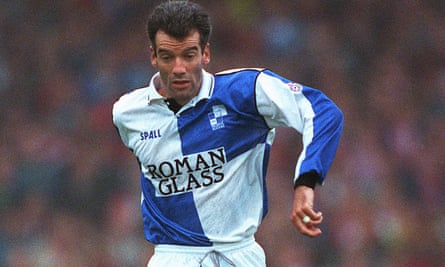
He was converted there into a right-back by the manager Gerry Francis but was occasionally played up front, where head clashes with opposing centre-backs were common. His medical notes show he sustained at least four serious concussions in his career, including one shocking incident in an FA Cup first-round game against Fisher Athletic in 1988, when he swallowed his tongue.
“I nearly died on the pitch once,” he says. “Right from the kick-off the ball was played up to me, and a centre-half came out of nowhere and smashed me. There was a clash of heads and the next thing I remember is being in hospital. I’d swallowed my tongue and half my denture plate. They told me I was about 20 or 30 seconds away from death.
“That happened on a Saturday and I was training again by Wednesday. I was supposed to play the next Saturday, but Gerry said he’d give me another week off so it was a fortnight before I came back. I didn’t think about the risks. It was my job, wasn’t it? You took the knocks, got on with it, and went again. Now it’s all coming to light.”
Alexander reveals that Rovers did not have a doctor at the Fisher game. “The referee shouldn’t have started the game because the doctor wasn’t there,” he says. “The club doctor was stuck in traffic and I didn’t see him until I was in the hospital. We never saw the doctor really; it was just physios.
“If it wasn’t for the club physio Roy Dolling, I would definitely have died. I swallowed my tongue, my denture plate snapped and half of it went down my throat. He used to carry a piece of metal in his kitbag. He flipped it down and pulled my teeth out.”
Alexander reflects with fondness on his life in football, albeit tinged with sadness at what it might have cost him. “I had a good life, but looking back, I think I could have a better life now,” he says. “I’m paying the price now. I played 299 games for Bristol Rovers – I wasn’t good enough to make 300!
“We won the [Third Division] league in 1990. Bristol City were second, so it was quite a year. We also got to Wembley that season, but lost in the final to Tranmere. I played at Anfield, St James’ Park, Ibrox, Parkhead. I had good days, good times. Made some good friends.
“The doctors gave me two to six years, but they say I’m quite fit. I’m not going to give in. I’m going to fight it till the end. I’ve got a good team around me with my wife and kids. And once the word gets out to Rovers fans I’ll have them behind me too.”
Source: theguardian.com


